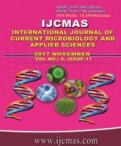


 National Academy of Agricultural Sciences (NAAS)
National Academy of Agricultural Sciences (NAAS)

|
PRINT ISSN : 2319-7692
Online ISSN : 2319-7706 Issues : 12 per year Publisher : Excellent Publishers Email : editorijcmas@gmail.com / submit@ijcmas.com Editor-in-chief: Dr.M.Prakash Index Copernicus ICV 2018: 95.39 NAAS RATING 2020: 5.38 |
The present investigation was carried out in the Dept. of Plant Pathology, IGKV, Raipur (C.G) during 2015-16. Basic seed pathological work were conducted with five pulse crops seeds namely green gram, black gram, chickpea, pea and pigeonpea periodically from 1-6 months at monthly interval. The seed health evaluation of various pulses by physical and incubation method was investigated. In all, eleven seed borne mycoflora viz. Aspergillus niger, Tricoderma sp., A. flavus, Fusarium sp., Rhizopus sp., Alternaria sp., Mucor sp., A. fumigatus, Aspergillus sp., Penicillium sp. and others (unidentified fungi) isolated by incubation methods viz. standard blotter and agar plate method. Seed lots were subjected to incubation methods i.e. standard blotter and agar plate shows increasing trend in frequencies of seeds borne mycoflora and decreasing trend in seed germination as the storage period increases. The reduction in seed germination due to association of various seed borne mycoflora clearly suggesting of role of seed borne mycoflora in reducing seed germination in all the pulses under study.
 |
 |
 |
 |
 |